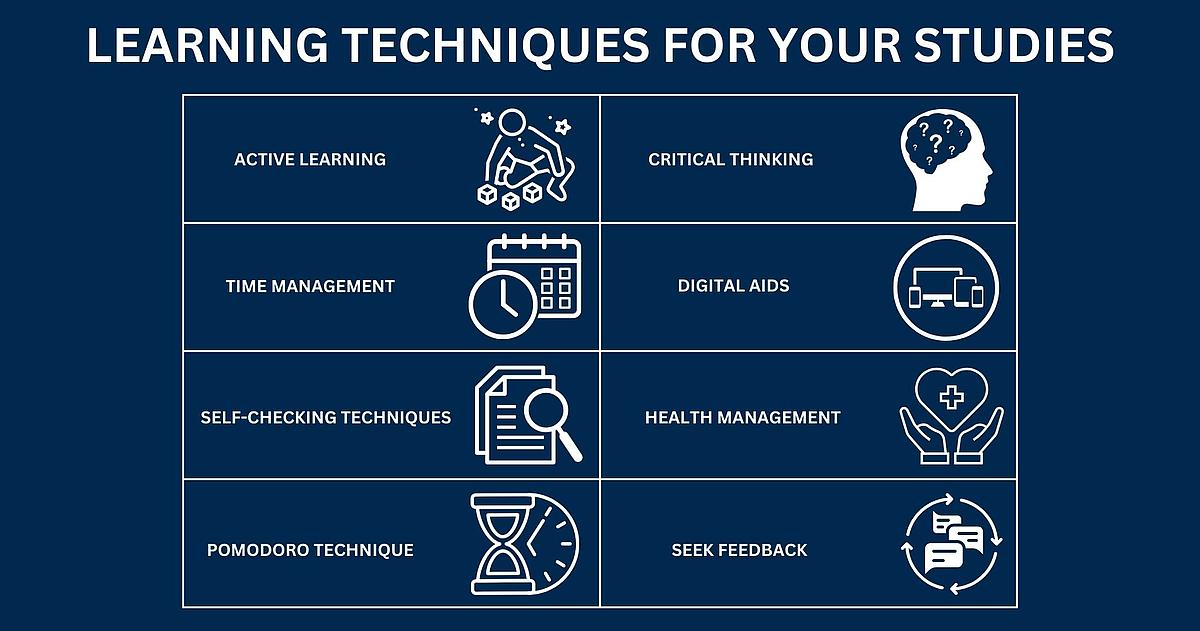This Website uses cookies to improve your visit on our website. More Info
10 Survival Tips for Your Start of Studies: How to Master the First Semester!
The start of studies marks an exciting and decisive stage in the lives of many young people. This new stage of life is not only a leap into academic waters, but also a time of personal development and change. From choosing the right university to dealing with your first lectures and seminars, the start of studies can be both challenging and inspiring. In this article, we explore the essential steps first-year students need to master and provide practical tips on how to make the first few weeks at university successful and stress-free.
Start of Studies Tip 1: Understand how studying works
Studying at a college or university involves several components and processes that are geared towards students' academic and personal progress and making the start of studies easier:
- Lectures and seminars: Lecturers and professors explain the basics and specialized content of a subject area. Students take part in these courses, take notes and discuss academic topics.
- Exercises and practicals: Many degree programs have practical exercises or lab sessions where students can apply what they have learned in lectures. This promotes practical understanding and the application of theoretical knowledge.
- Self-study: A large part of the study program consists of independent learning. Students read specialist literature, prepare presentations, write term papers and study for examinations.
- Examinations and assessments: In order to assess progress, students have to take various forms of examinations, including written examinations, oral examinations and project work.
- Thesis: In most degree programs, students are required to write a thesis (Bachelor's thesis, Master's thesis) in order to graduate. Students work independently on a scientific question.
- Extracurricular activities: Universities also offer many extracurricular opportunities, such as sports, music, art and various clubs, which can contribute to personal development.
The study program promotes critical thinking, self-management and professional skills that are important for students' personal and professional future. Being aware of this helps you to look forward to the start of studies in a positive light.
Start of Studies Tip 2: Secure a grant for the start of studies
Many students need financial support to cover the costs of the start of studies. It is advisable to find out about the various funding options early on and submit the necessary applications. Many universities offer student finance advice services that can help you choose and apply for the right support. Here are some of the common grants and financial aid available for the start of studies:
| BAföG | In Germany, the Federal Training Assistance Act (BAföG) is one of the most important sources of student funding. It provides financial support for students who cannot be adequately supported by their parents. Part of the BAföG is an interest-free loan that must be repaid after study, while the other part is a grant. |
|---|---|
| Scholarships | There are numerous scholarships from universities, foundations, companies and other organizations. These scholarships can be based on academic performance, social criteria or special abilities. They are usually non-repayable and can make a significant financial contribution to your studies. |
| Educational loan | The educational loan is a low-interest loan from the federal government that is specifically intended for advanced students. It can be a supplement to BAföG and is aimed at financing the final phase of study. |
| Student loans | Various banks and credit institutions offer student loans that are flexibly tailored to the needs of students. However, these loans are often subject to interest and must be repaid after the study period. |
| Housing benefit | Under certain conditions, students can apply for housing benefit to reduce their housing costs. The amount of housing benefit depends on income and housing costs. |
| Family support | Many students also receive financial support from their parents or other family members. Under certain circumstances, parents can also receive tax benefits by supporting their student children. |
| Part-time jobs | Many students finance their studies through part-time jobs. There are numerous job opportunities for students, both on campus and in the surrounding area. |
| Social assistance | In special cases, students may also be entitled to social assistance. However, this is usually an exception, as students are primarily supported by other programs. |
More on this Topic:
Student Loan
Working alongside your Studies
Working Student
Start of studies tip 3: Prepare for the start of studies
In order to optimally prepare for your start of studies and plan everything important, it makes sense to take a few targeted steps. By familiarizing yourself with these systems and processes early on, you can ensure that your start of studies goes smoothly and that you can concentrate fully on your studies.
Inform and Plan
Start by informing yourself thoroughly about your degree program and the university. Check the study plan to understand which courses and modules are offered in which semester. This will help you get an overview of your academic commitments right at the start of studies and plan your time effectively.
Registration and Administrative Tasks
Complete all administrative tasks in good time before or at the start of studies. This includes enrollment, i.e. official registration at the university, as well as setting up your student account and email inbox. This account is important as it will give you access to learning materials, your timetable and university announcements.

Apply for a University ID Card
The student ID card is an essential document that offers you many benefits. It not only allows you to use the library and borrow teaching materials, but also gives you discounts in canteens, on public transport and at various cultural institutions. The card is usually issued after enrollment, i.e. directly at the start of studies. To apply, you usually have to upload a photo of yourself and provide the required documents. The completed ID card can either be collected directly from the university or sent to you by post.
Financial Planning
Make sure that your funding is secured for the start of studies. This can be through BAföG, scholarships, a student loan or part-time jobs. It is also advisable to draw up a budget for monthly expenses to keep track of your finances.
Clarify your Housing Situation
If you have to move, make sure you find suitable accommodation early on. The options range from halls of residence and shared flats to your own apartment. Note that the housing market in university cities is often very tight, especially at the start of studies.
Learning Materials and Technical Equipment
Get all the learning materials you need, such as books, lecture notes and specialist literature, before or at the start of studies. Technical aids such as a laptop and possibly special software are also important in order to be able to study effectively.
Networking
Try to make contact with other students before the start of studies or directly at the start of studies, for example via social networks or introductory events. This can help you to settle in more quickly and find support in your everyday study life.
Attend Orientation Events
Take part in all introductory and orientation events. These events are an excellent way to get important information about your degree program right at the start of studies, get to know the campus and make contacts.

Start of studies tip 4:
Get to know your place of study

Start of studies tip 4:
| Explore the campus | Take your time to explore the campus thoroughly. Find out where the different faculties, lecture halls, libraries, canteens and administrative offices are. Many universities offer campus tours, often led by older students who can provide valuable insider tips. |
|---|---|
| Libraries and study spaces | Explore the various libraries and study spaces offered by the university. These places will be of great importance during your studies. Find out about borrowing arrangements and the availability of workstations. |
| Use university services | Familiarize yourself with the various services offered by your university. These may include advising services, academic support services, career centers and health care. These resources can help you if you need support during your studies. |
| Explore your study destination | Spend time exploring the city or town you are studying in. Get to know the public transportation, find out where you can shop and discover places where you can spend your free time. This will help you to settle in more quickly. |
| Social contacts and networks | Get involved in student groups, clubs or sports teams. This gives you the opportunity to meet new people, make friends and build a support network. |
| Events and Orientation Weeks | Attending university events and especially Orientation Week can be particularly useful. These events are designed to help new students get started and provide them with important information about studying and life at the university. |
Getting to know the place of study and the university is an important step towards the start of studies in order to feel comfortable in the new environment and to be able to study effectively. These are some suggestions on how you can organize this process. Through these activities you can ensure a good start of studies and your life at your new place of study.
start of studies Tip 5: Use pre-courses
Pre-courses at universities are an excellent way to prepare for the upcoming start of studies, especially in subject-specific basics that are important for your studies. Here are some aspects of why and how you should use pre-courses:
Brush up on Subject Basics
Pre-courses are particularly useful for refreshing school knowledge in subjects such as mathematics, physics, chemistry or languages, which is essential for your studies. They help you to close any gaps and provide a solid foundation for the start of studies.
Adapt to the University level
These courses offer a first insight into the level and speed of learning at a university. They prepare you before your official start of studies for how material is presented in lectures and how you can deal with it effectively.
Meet Fellow Students
Pre-courses are also an opportunity to meet your future fellow students before the start of studies and to form initial social networks. Such early contacts can be supportive throughout your studies.
Get to know the Teaching Staff
The preliminary courses are often held by lecturers who will later teach in the regular study program. This is a good opportunity to get to know teaching staff before the start of studies and perhaps make useful contacts.
Develop Study Strategies
Pre-courses give you the opportunity to test and adapt your study strategies before the start of your studies. You can find out which techniques work best for you without the pressure of regular coursework.
Explore University Facilities
During the preliminary courses, you can familiarize yourself with the university facilities, such as libraries, computer rooms and student advice centers. You will learn how and where to find resources for your studies before the start of studies.
To benefit from pre-courses, you should find out about the courses offered by your university in good time before the start of your studies and register accordingly. Please note that some courses may be subject to a fee or have a limited number of participants. Take this opportunity to be optimally prepared and confident in your ability to enjoy the start of your studies.
DID YOU ALREADY KNOW?:
Munich Business School offers both a Pre-Bachelor and a Pre-Master to prepare you optimally for your MBS studies.
Start of studies tip 6: Adapt learning techniques to new challenges
To be successful in your studies, it's crucial to develop effective study techniques that contribute to independence. Here are some methods and strategies that can help you improve your study skills for the start of studies.
Overview: Important Learning Techniques for the Start of Studies
The following graphic provides a brief overview of important study techniques that can help many prospective students adapt to new challenges at the start of studies.

Explanation: Important Learning Techniques for the Start of your Studies
By using these techniques, you can not only improve your study skills at the start of studies, but also achieve greater independence in your studies.
Active Learning
Instead of just passively reading or listening to lectures, you should actively work with the material. This can mean taking notes, writing summaries, creating mind maps or forming study groups to discuss content.
Time Management
Good planning is crucial. Create a study plan that includes both regular study times and breaks. Use calendars and planning tools to manage your tasks and deadlines and prioritize your study tasks.
Self-Review Techniques
Use techniques such as flashcards, practice tests or self-quizzes to consolidate your knowledge. These methods not only help you to learn, but also to identify gaps in your knowledge.
Pomodoro Technique
This is a time management method that divides learning into 25-minute focus blocks, followed by a five-minute break. After four such blocks, take a longer break of 15-30 minutes. This technique helps to maintain concentration and avoid fatigue.
Critical Thinking
Challenge yourself to think about the subject matter and make connections to other topics. Developing a critical perspective can help you gain deeper understanding and improve your memory.
Digital Tools
Use technological resources such as time management apps, digital notebooks, or specialized learning software tailored to your study needs. Many universities also offer access to online resources and databases.
Health Management
Good physical and mental health supports effective learning. Make sure you get enough sleep, eat healthily, exercise regularly and take breaks to minimize stress.
Seek Feedback
Take advantage of opportunities to get feedback from lecturers and fellow students. This can help you to review your learning progress and identify areas where you can improve.
More on this Topic:
Study Strategies

Start of studies tip 7: See study as a
bridge between learning and the world of work

Start of studies Tip 7:
| Gain practical experience | Internships, working student activities or part-time jobs in your field of study are an excellent way to gain practical experience. These experiences are not only valuable for applying what you have learned in practice, but also for building professional networks and getting a foot in the door of the working world. |
|---|---|
| Develop soft skills | Employers value not only technical knowledge, but also soft skills such as teamwork, communication and problem-solving skills. Use group projects, presentations and other interactive aspects of your studies to develop these skills. |
| Build professional networks | Networking is crucial for professional success. Get involved in career-related student organizations, attend industry conferences and events, and use LinkedIn and other professional networks to make connections. |
| Seek mentoring and advice | Many universities offer mentoring programs where students can receive advice from experienced professionals or alumni. Such relationships can provide valuable insights into the world of work and help with career entry. |
| Take advantage of continuing education opportunities | Many universities offer courses and workshops focused on career preparation, such as resume writing, interview techniques or career planning. Use these resources to prepare for your job search. |
| Choose your thesis strategically | If possible, choose a topic for your thesis that is relevant to potential employers in your desired field. This can send a strong signal to future employers that you have specialized knowledge and a high level of expertise in the field. |
| Take advantage of internationality | If you have the opportunity to study or work abroad, make the most of it. International experience is particularly valuable and increases your attractiveness on the global job market. |
| Follow current trends | Keep up to date with trends and developments in your industry. This can be done by reading specialist literature, subscribing to industry news or participating in relevant webinars. |
| Project work | Get involved in projects that give you the opportunity to solve real-world problems. This shows potential employers that you are able to put theoretical knowledge into practice. |
Studying offers a unique opportunity to act as a bridge between the academic world and the world of work. These are some strategies you can put in place at the start of studies to make the most of your studies to prepare for the transition into the world of work. By integrating these elements before your start of studies, you can lay the foundations for a successful career and make the transition from university to the world of work a smooth one.
Start of Studies Tip 8: Study internationally, if possible
Experience abroad during your studies offers numerous benefits that can greatly enhance both your personal and professional development. It would also be something special to look forward to before you start of studies. Here are some aspects of how and why spending time abroad during your studies is valuable:

- Cultural competence: A study or internship abroad offers the opportunity to immerse yourself in another culture, which deepens your understanding of different perspectives and ways of life. This intercultural competence is particularly valuable in our globalized world.
- Improve language skills: Everyday life in a foreign country allows you to practice and improve your language skills. Language skills are not only highly valued on the job market, but also open up personal and professional opportunities worldwide.
- Independence and adaptability: The challenges associated with living and studying in an unfamiliar environment foster important personal qualities such as independence, flexibility and problem-solving skills.
- Build a network: Studying abroad can help you build an international network. Contacts with fellow students, professors and professionals abroad can be of great benefit to your future academic and professional career.
- Broaden your academic experience: Many foreign universities offer special courses and research opportunities that may not be available at your home university. These can give you new academic perspectives and access to specialized resources.
- Improve career opportunities: Employers value candidates who can demonstrate experience abroad as they are often perceived as more adaptable, innovative and with better communication skills. A period abroad on your CV can give you a decisive advantage when competing for jobs.
- Personal growth: Beyond the purely academic and professional benefits, a stay abroad offers the opportunity to develop personally, make new friends and gain unforgettable experiences.
Implementation of a Stay Abroad
Planning and organization are crucial for a successful stay abroad. Find out about programs such as ERASMUS+, Fulbright or DAAD, which offer financial support and organizational help. Attend information events at your university about studying abroad and talk to student advisors to find the right program and destination country. It is also important to start planning in good time in order to fulfill all the necessary documents and visa requirements. However, this does not have to happen right at the start of studies.
DID YOU KNOW?:
Munich Business School offers both an international study atmosphere, with students from all over the world and English-language course content on the international market, as well as an integrated semester abroad and possible internships abroad. You can find more information in our International Center.
Start of studies tip 9: Make contacts and experience new things
Socializing and learning new skills outside of formal study are essential aspects of university life that contribute to personal and professional development. By engaging in the following activities, you can not only broaden your horizons and learn new skills before the start of studies, but also build valuable social and professional networks that will benefit you during your studies and beyond. Here are some strategies and ways you can do this effectively at and after the start of studies:
Student Organizations and Clubs
Join student organizations, clubs or societies that match your interests. Whether sports, art, culture, politics or social engagement - almost every university offers a variety of groups that allow you to meet like-minded people and gain valuable experience, often even before the start of studies.
Workshops and Seminars
Take advantage of the range of workshops and seminars organized by the university or external providers. These events can cover topics such as time management, communication skills, leadership skills and many other areas and are often free or inexpensive for students.
Volunteering
Get involved in volunteering, whether it's within the university or in the local community. This can be an excellent way to gain practical experience, meet new people and make a positive contribution.


Internships and Part-Time Jobs
Look for internships or part-time jobs that match your field of study or interest you. These positions not only offer the opportunity to gain practical experience and apply what you have learned, but also to build professional networks.
Networking Events and Conferences
Attending networking events, conferences and trade fairs can help you make contacts in industry or academic circles. Such events are also a good platform to keep up to date with the latest developments in your field.
Language Exchange and Intercultural Meetings
Take the opportunity to participate in language exchange programs or attend intercultural meetings. These are particularly useful for improving language skills and learning more about other cultures.
Online Learning Platforms
Use online resources and learning platforms such as Coursera, edX, Khan Academy or LinkedIn Learning to learn additional skills that may not be directly offered as part of your studies.
Start of studies tip 10: Use our checklist for the start of studies to make sure you don't forget anything
Here is a checklist for the start of studies to help you get organized and make sure you have considered and prepared everything important:
| Before the start of the semester | ||
|---|---|---|
| Check admission documents | Make sure that all required documents have been submitted and confirmed. | |
| Apply for student ID | If you have not already done so, submit the necessary photo and make sure that your student ID is issued. | |
| Set up your student e-mail account | Set up your university e-mail account and check it regularly for important messages. | |
| Complete course registration | Register for required courses as soon as registration is open. | |
| Clarify housing situation | Make sure you have a place to live if you need to move. | |
| Financial planning | Check your financing options, such as BAföG, scholarships or financial support from your family. | |
| Obtain learning materials | Buy or borrow all necessary books and materials. | |
| Make a note of orientation events | Plan to attend all relevant orientation events. | |
| At the beginning of the semester | ||
| Explore campus | Get to know the campus, find out where important places like libraries, canteens and administrative offices are. | |
| Organize your timetable | Make sure you have a clear timetable and know when and where your classes are taking place. | |
| Plan your means of transport | Organize your daily journey to university, whether by public transport, bicycle or car. | |
| Socialize | Try to meet fellow students in your courses and on campus. | |
| During the semester | ||
| Schedule regular study times | Set up fixed times for studying and preparing for exams. | |
| Health and well-being | Make sure you eat a balanced diet, exercise regularly and get enough sleep. | |
| Use advice and support services | Use the advice and support services offered by the university if necessary. | |
| Obtain and adapt feedback | Obtain regular feedback and adapt your study strategies accordingly. |
This checklist is designed to help you get organized and prepared for the start of studies. Each point will help you to keep an overview and minimize possible stress factors before and after the start of your studies.
Similar Study Guide Topics:
What should I study?
Working alongside your Studies
Internship Abroad
Semester Abroad
Student Loan
Study Strategies
FAQ
The application deadlines for a study program depend on the type of program and the university. In general, the application deadline is usually July 15 for the start of studies in the winter semester and January 15 for the summer semester. These dates may vary for degree programs with a local Numerus Clausus or for admission-free degree programs. It is important that you find out about the specific deadlines and required documents on the websites of the respective universities in good time before the usual start times.
For the start of studies, you will usually need important documents such as your identity card, your university entrance qualification (e.g. school-leaving certificate), your health insurance certificate and possibly proof of language skills or other qualifications. You should also take care of organizational aspects such as enrolling, opening a bank account and registering with the residents' registration office if you are moving for the start of studies. It is also advisable to find out about the course content, the campus and the required teaching materials such as books and specialist literature before the start of studies.
The start of studies semester, often referred to as the first semester or first subject semester, is the beginning of your studies at a university, i.e. the first semester after your start of studies. In this semester at the start of studies, students are introduced to the basics of their chosen subject and become familiar with important academic and social structures at the university. It is a time of orientation in which new students familiarize themselves with the campus, the teaching methods and the requirements of their studies. The first semester plays a central role in laying the foundations for the rest of the course.
Yes, after a rejection you can reapply for a study program. It is possible to reapply for the same or a different degree program with a different start of studies in the next application cycle. A previous rejection has no influence on future applications. It may be helpful to review your application and improve it if necessary to increase your chances of being admitted to the next start of studies.
Practical gifts that make student life easier are very popular at the start of studies. These include a high-quality backpack, a laptop, stationery or a notebook. Vouchers for books or electronic items are also well received at the start of studies. A coffee machine, a practical kitchen aid or a supply of food can also be useful for everyday life at university. Another nice idea for the start of studies is something to decorate the new living space, such as plants or wall art. More personal gifts for the start of studies could be a self-made study planner or a voucher for an experience in the new city.
Interested in a study program? Request our information material now!
More exciting degree programs in Munich













